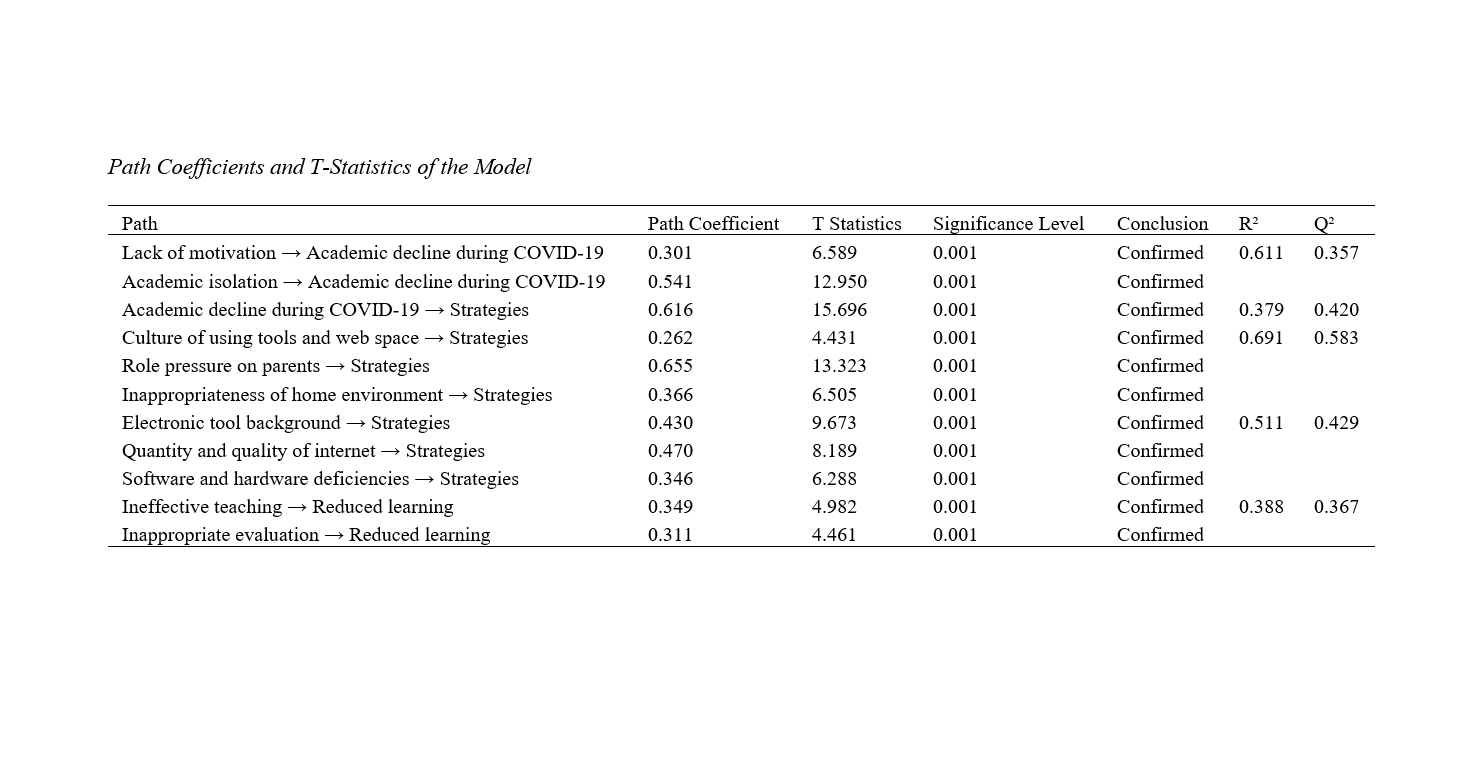Predictive Model for Student Academic Decline During Virtual Education in the COVID-19 Pandemic
Keywords:
Academic Decline, Virtual Education, COVID-19 PandemicAbstract
Academic decline has always been a primary concern for researchers in the field of education. Recently, the COVID-19 pandemic has shed new light on this phenomenon. This study aims to identify factors affecting academic decline during the COVID-19 pandemic and develop a model to predict academic decline during virtual education. The present research employed a mixed qualitative-quantitative methodology. The study population included all mothers, students, and teachers of middle and high school levels in the city of Sabzevar in 2021. A sample of 30 individuals was selected through purposive sampling due to data saturation, considering inclusion and exclusion criteria, and interviewed. Following the identification and validation of qualitative categories and factors, a questionnaire was designed and administered to 384 participants (mothers, students, and teachers of middle and high school levels). The unlimited population responded to the researcher-made 49-item questionnaire on the challenges of virtual education impacting academic decline during the COVID-19 pandemic. To test the research hypotheses, descriptive statistics and structural equation modeling (SEM) using SPSS 20 and PLS Smart software were utilized. The findings indicated that, following qualitative interviews, six main grounded theory categories emerged, encompassing 12 fundamental factors. These included two causal factors (lack of motivation and academic isolation), one central factor (academic decline), three contextual factors (quantity and quality of electronic devices, internet quality, and software and hardware deficiencies), three intervening factors (role pressure on parents, web usage culture, and learning environment), and two strategies (ineffective teaching and inappropriate assessment) and one outcome (reduced learning). Ultimately, the structural equation modeling validated the conceptual model designed based on grounded theory. The results indicated that 12 fundamental factors influenced academic decline during virtual education amidst the COVID-19 pandemic, leading to the development of a significant predictive model for academic decline in virtual education.
Downloads
References
1. Abdullah F, Ward R. Developing a General Extended Technology Acceptance Model for E-Learning (GETAMEL) by analysing commonly used external factors. Computers in Human Behavior. 2016;56:238-56. [DOI]
2. Alhomod S, Shafi MM. Success factors of e-learning projects: A technical perspective. Turkish Online Journal of Educational Technology-TOJET. 2013;12(2):247-53.
3. Altınay Z. Evaluating peer learning and assessment in online collaborative learning environments. Behaviour & Information Technology. 2017;36(3):312-20. [DOI]
4. Amin Z, Mansoor A, Hussain SR, Hashmat F. Impact of social media of student’s academic performance. International Journal of Business and Management Invention. 2016;5(4):22-9.
5. Mehmood S, Taswir T. The effects of social networking sites on the academic performance of students in college of applied sciences, Nizwa, Oman. International Journal of Arts and Commerce. 2013;2(1):111-25.
6. Aydın CH, Tasci D. Measuring readiness for e-learning: Reflections from an emerging country. Journal of Educational Technology & Society. 2005;8(4):244-57.
7. Cidral WA, Oliveira T, Di Felice M, Aparicio M. E-learning success determinants: Brazilian empirical study. Computers & Education. 2018;122:273-90. [DOI]
8. Fauzi I, Sastra Khusuma IH. Teachers’ Elementary School in Online Learning of COVID-19 Pandemic Conditions. Jurnal Iqra' : Kajian Ilmu Pendidikan. 2020;5(1):58-70. [DOI]
9. Huber SG, Helm C. COVID-19 and schooling: evaluation, assessment and accountability in times of crises—reacting quickly to explore key issues for policy, practice and research with the school barometer. Educational Assessment, Evaluation and Accountability. 2020;32(2):237-70. [PMID: 32837626] [PMCID: PMC7286213] [DOI]
10. Ali IEH, editor Measuring Students e–Readiness for e–Learning at Egyptian Faculties of Tourism and Hotels. Conference proceedings of» eLearning and Software for Education «(eLSE); 2010: Carol I National Defence University Publishing House.
11. König J, Jäger-Biela DJ, Glutsch N. Adapting to online teaching during COVID-19 school closure: teacher education and teacher competence effects among early career teachers in Germany. European Journal of Teacher Education. 2020;43(4):608-22. [DOI]
12. Rasmitadila R, Aliyyah RR, Rachmadtullah R, Samsudin A, Syaodih E, Nurtanto M, et al. The Perceptions of Primary School Teachers of Online Learning during the COVID-19 Pandemic Period: A Case Study in Indonesia. Journal of Ethnic and Cultural Studies. 2020;7(2):90-109. [DOI]
13. Jiang B, Li X, Liu S, Hao C, Zhang G, Lin Q. Experience of online learning from COVID-19: Preparing for the future of digital transformation in education. International Journal of Environmental Research and Public Health. 2022;19(24):16787. [PMID: 36554668] [PMCID: PMC9779375] [DOI]
14. Yokoyama S. Academic Self-Efficacy and Academic Performance in Online Learning: A Mini Review. Frontiers in Psychology. 2019;9. [PMID: 30740084] [PMCID: PMC6357917] [DOI]
15. Fan Q, Wang H, Kong W, Zhang W, Li Z, Wang Y. Online Learning-Related Visual Function Impairment During and After the COVID-19 Pandemic. Frontiers in Public Health. 2021;9. [PMID: 34912766] [PMCID: PMC8666689] [DOI]
16. Molato BJ, Sehularo LA. Recommendations for online learning challenges in nursing education during the COVID-19 pandemic. curationis. 2022;45(1):2360. [PMID: 36331216] [PMCID: PMC9634659] [DOI]
17. Camargo CP, Tempski PZ, Busnardo FF, de Arruda Martins M, Gemperli R. Online learning and COVID-19: a meta-synthesis analysis. Clinics. 2020;75:e2286. [PMID: 33174948] [PMCID: PMC7605278] [DOI]
18. Chandrasiri NR, Weerakoon BS. Online learning during the COVID-19 pandemic: Perceptions of allied health sciences undergraduates. Radiography. 2022;28(2):545-9. [PMID: 34893435] [PMCID: PMC8649784] [DOI]
19. Kern P, Tague DB. Students’ Perception of Online Learning During COVID-19: A U.S.-Based Music Therapy Survey. Journal of Music Therapy. 2022;59(2):127-55. [PMID: 35325173] [DOI]
20. Martínez-Caro E. Factors affecting effectiveness in e-learning: An analysis in production management courses. Comp Applic In Engineering. 2011;19(3):572-81. [DOI]

Downloads
Additional Files
Published
Submitted
Revised
Accepted
License
Copyright (c) 2024 Zohre Delbari (Author); Seyedeh Hamideh Salim Bahrami (Corresponding Author); Abolqasem Baradaran, Mojtabi Rezaei Rad (Author)

This work is licensed under a Creative Commons Attribution-NonCommercial 4.0 International License.















